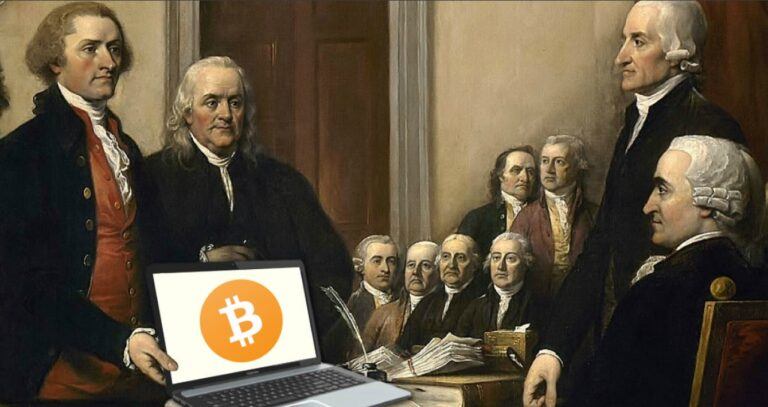The United States of America is the country that we have to thank for when we talk about cryptocurrencies, technology, and the freedom to pursue innovative goals. The very first Bitcoin transfer was to Hal Finney, the 1982 publishing of “The Byzantine Generals Problem”, Nick Szabo’s experimentation with BitGold, David Chaum’s ‘DigiCash’ and almost all big events in cryptography seem to have taken place in the U.S..
Furthermore, if we take into account the other big names in crypto like Ethereum, Litecoin, Ripple, and even Bitcoin Cash, then we notice that much of the development in within the crypto-asset field has taken place in the U.S., the internet itself is an American invention, but that’s another story for another day.
However, what is really fascinating about American culture and politics is the legitimation of the status-quo through the views and thoughts of their founding fathers. They are the framers of a ground-breaking constitution, the people who made this liberal democratic republic happen, and the bold thinkers who defied the experiences of other nations and experimented with a large federal state. Their start-up project, The United States of America, has proved to be excellent for development, growth, and innovation.
But at the same time, whenever a crisis occurs, the analysts ask themselves “What would our Founding Fathers think about this situation?”. It happens often in the cases of gun control and European left-wing policies, and it’s inevitable to happen with Bitcoin.
So What Would The US Founding Fathers Think About Bitcoin?
Overall, it’s pretty safe to assume that they would have loved it.
We’re talking about some of the most educated minds the world had seen back in 1787, whose boldness has produced a constitution and a political framework which still functions to this day. They opposed the British influence and have fought to gain independence, so it makes sense that they would have sought a mean of payments that isn’t controlled by the monarchy in Buckingham Palace.
At the same time, there are some noteworthy particularities that should be mentioned. Not all framers of the US constitution had the same ideals and approaches, and Patrick Henry even opposed the idea of a new fundamental law by arguing for the preservation of the Articles of Confederation. So, if you may, Patrick Henry was the Roger Ver of his time. A controversial thinker who wanted to preserve the old ways which he knew and thought were good enough and lobbied to keep them. But unlike the Bitcoin Cash founder, he didn’t have the means, and nor did he possess the resources to create an alternative state which reflects his exact views, so he accepted the majority’s consensus and even went on the defend the Bill of Rights.
Now let’s make the obvious statement: Benjamin Franklyn, the brilliant innovator and inventor, would have probably set up mining farms and concealed stacks of video cards in the lesser visited chambers of the Congress building. To him, the idea of changing the way our civilization perceives value and payments would have been enough of a reason to pursue innovations in the cryptocurrency field.
Hamilton, Jefferson, and Madison
On the other hand, Alexander Hamilton, who is known for supporting the idea of a central bank, would have probably been in favor of exchanges which store a federal reserve of Bitcoin. He may have loved the concept of Bitcoin, but his views would have probably reflected textbook economic protectionism. In the mind of Hamilton, decentralization wouldn’t be such a good idea as it would have undermined the authority of the central bank.
Now let’s talk about Thomas Jefferson, the guy who did such a great job as an ambassador in France that they’ve built a statue of him in Paris on the bank of Seine. He also supported the 1789 French revolution and seemed to be an ardent proponent of freedom and republicanism. The power must be in the hands of the people, not in the palaces of rich aristocrats and eccentric princes. By today’s standards, he was a big-time libertarian who feared that the excessive growth of the federal government would interfere with civil liberties. Considering how many Bitcoin maximalists are libertarians, Jefferson would have loved the revolutionary and disruptive potential of Bitcoin, and may have promoted it and allowed it to circulate freely during his years as a diplomat and throughout his presidency.
James Madison, the father of the US Constitution and the brilliant mind behind the Bill of Rights is responsible for one of the most influential treaties on modern politics. In Federalist No. 10, he basically suggested that the best approach to factions is to allow them to exist and clash in interests. Sure, he didn’t foresee the rise of corporations, but he did have a good point about human nature and laissez-faire politics. Madison would have loved Bitcoin and the fact that it creates competition to the traditional financial system. Also, much like his good friend Thomas Jefferson, he would have disagreed with sanctions and excessive taxation – if it’s innovative enough to disrupt important aspects of human civilization, then it’s better to let it develop.
Jay, Washington, and Conclusions
Even though there are other notable American figures who contributed to the writing of the US constitution, the opinions of only two of them will be added to this article. John Jay was perhaps one of the biggest advocates of a strong central government, and he even favoured Hamilton’s Federalist Party. Therefore, much like his friend, he wouldn’t have really have liked the decentralization that Bitcoin brings and would have probably proposed harsh regulations. With the aim of maintaining state control over the monetary supply.
Now let’s talk about George Washington himself, the man who did his best to remain independent in his decisions and unbiased in regards to his political choices. Throughout his two terms, he refused to formally adhere to one of the two parties that were formed, though he did seem to have a bias towards favouring the more centralization-oriented Federalist Party.
His military intervention in the 1794 Whisky Rebellion, which started due to increased taxes on alcohol, points out that General Washington wouldn’t have been a big fan of Bitcoin at all. Had any cryptocurrency interfered with the federal state’s ability to collect taxes, his policies would have probably neglected civil liberties for the sake of setting the record state in the favour of the government.
So there you have it, a brief coverage of what the US founding fathers would have thought! Though the coverage only scratches the surface, now we know bits of the debates that are going to be had on television whenever Bitcoin generates a massive financial event in the United States and regulators call for action. People will ask themselves what the framers of the Constitution would think, and these are some of the answers and arguments.









